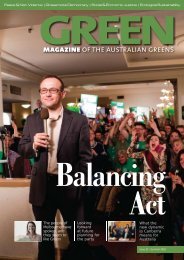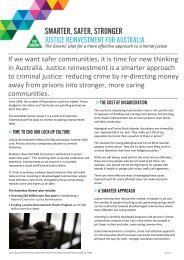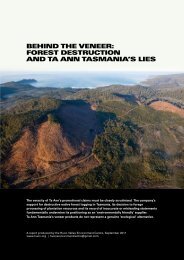news & views - Australian Greens
news & views - Australian Greens
news & views - Australian Greens
Create successful ePaper yourself
Turn your PDF publications into a flip-book with our unique Google optimized e-Paper software.
Autumn 2007 ISSUE 22 PAGE 2<br />
This edition links with the previous two editions on energy<br />
and climate change. These were critical of the failure of<br />
<strong>Australian</strong> governments which have presided over many wasted<br />
opportunities in areas like energy efficiency and renewable<br />
energy. This same period has also seen wasted opportunities in<br />
terms of organizing our living patterns and communities along<br />
more sustainable lines. There has certainly been no shortage<br />
of challenges to the quality of people’s lives by ill-considered<br />
and unsustainable development projects but the community<br />
opposition to these has usually been piecemeal or NIMBY in<br />
nature rather than resulting in grassroots action for sustainable<br />
forms of living and community development. There are also<br />
widespread examples of popular adoption of unsustainable<br />
practices. The popularity of cars and air conditioning over the<br />
last decade is a testimony to this.<br />
This is likely to change dramatically in the next few years as<br />
people everywhere respond to current environmental challenges<br />
and realize that only new ways of organising social life and<br />
resources can effectively combat global warming. Citizens facing<br />
prolonged drought and water shortages begin to realize that the<br />
water they use in their homes is connected to and dependent on<br />
a finite resource that also underpins the environmental health of<br />
their region. They therefore adjust their consumption patterns.<br />
In our home city of Brisbane residents are responding to a serious<br />
drought and rapidly declining dam levels by making the building<br />
and installation of rain water tanks one of the busiest local<br />
industries. Likewise, energy efficient practices and technologies<br />
are being integrated into people’s lifestyles as the consciousness<br />
of the need for everyone to do their bit to reduce greenhouse gas<br />
emissions takes quantum leaps.<br />
editorial<br />
However, this edition of Green takes the view that<br />
living sustainably has many more benefits than simply<br />
responding to environmental threats. The ecological<br />
imperative actually provides us with the opportunity to<br />
introduce more collectivist, human-centered approaches<br />
to living in communities that accords better with meeting<br />
human needs than the rampant consumerism that has<br />
characterised capitalism in the developed world over the<br />
last half-century.<br />
This view is articulated in this edition by John Hillcoat<br />
and Brian Hoepper who argue that modern consumerism<br />
is not only environmentally irresponsible and socially<br />
unjust on a global scale but also undermines those<br />
bonds of community solidarity that help make life<br />
more meaningful. Peter Cock, a veteran of <strong>Australian</strong><br />
intentional communities, argues that an alternative mode<br />
of living which he and others pioneered in the seventies<br />
remains as relevant as ever. John Tracey explains that<br />
Indigenous culture can inform the goal of sustainable<br />
living even in such an embattled community as Palm<br />
Island. Sharon Beder reminds us that living a sustainable<br />
lifestyle is not as simple as buying some carbon credits.<br />
And three important articles provide practical insights<br />
into living more sustainably in everyday life - Kathleen<br />
Maltzahn and Andrea Sharam describe local water<br />
management in Melbourne, Lori Puster advocates and<br />
explains ‘energy services’ and David Wyatt unveils<br />
dramatically more sustainable paper production.<br />
We would also remind readers that we encourage goodnatured<br />
debate through our letters page like the response<br />
here by Ralph Cooper to Mark Diesendorf’s article in<br />
Green #21 . Please feel free to send us your contributions.<br />
We would also like to thank those members who send in<br />
book re<strong>views</strong>.<br />
Drew Hutton and Brian Hoepper












